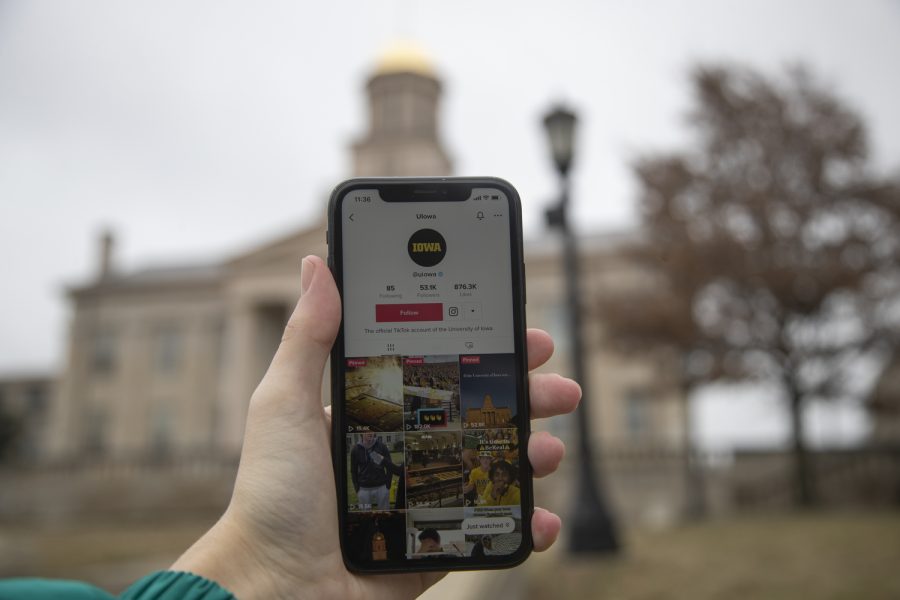UI enforces TikTok ban at administrative level
Content creation, posting, and management are banned for official university accounts while leaving choices open to student organizations and the campus at large.
University of Iowa TikTok page outside Old Capitol Building in downtown Iowa City Thursday, Jan. 19, 2023.
January 22, 2023
TikTok accounts of multiple University of Iowa student organizations — such as UI Undergraduate Student Government — remain active following the state Board of Regents’ ban on the app in December 2022.
The UI Office of Strategic Communication ceased new activity on the university’s official TikTok account after Gov. Kim Reynolds announced a ban on the platform for state devices on Dec. 13, 2022.
The ban comes as multiple universities across the country are implementing TikTok bans for university-owned devices or devices using university Wi-Fi, including Auburn University, the University of Florida, and the University of Texas-Austin, citing concerns over cybersecurity.
Regents President Mike Richards released a statement Dec. 15, 2022, directing institutions to remove and prevent the installation of TikTok on institution-owned devices. In addition, the statement called for the end of the creation and management of content on TikTok accounts owned or controlled by institutions.
RELATED: Gov. Kim Reynolds bans TikTok on state-owned devices
Josh Lehman, the senior communications director for the regents, wrote in an email to The Daily Iowan that student organizations’ TikTok accounts remain active because they are not controlled by the university.
“The universities are responsible for implementation of the directives,” Lehman wrote.
The official TikTok account for the UI has 53,200 followers. It was run by the Office of Strategic Communication since its creation in August 2020. The account has been inactive since the December ban.
UI social media manager Alexandra Bush wrote in an email to the DI that the account is currently not posting any new content.
“We used TikTok to strengthen our brand among younger audiences, and most specifically, to help with student recruitment,” Bush wrote.
The university is following the recommendation from the regents and will not resume use of TikTok creation, posting, and management until directed otherwise, Bush wrote.
“Of the accounts currently managed by the University of Iowa social media team, Instagram has the highest numbers of engagement among current and prospective students,” Bush wrote.
Bush also wrote the university’s Instagram was created in 2013, has more than 113,000 followers, and receives millions of interactions each year.
Despite national concern and warnings of security risks from Reynolds and the regents, some UI students continue using the app.
Claire Rooney, a UI fourth-year student majoring in history, uses TikTok but said she can see the reasons for banning it for government devices.
“I am concerned about security risks at large but not on a personal level. I understand that there’s a security risk to vital important information such as government information,” Rooney said. “However, for me personally, I don’t say any of those things out loud, and up until I see definitive proof that they are taking the information off my phone, it is fine for me.”
She said the practice of public universities banning the app entirely might toe the line of freedom of speech.
“However, as long as they’re not banning students from using it, having it, or making TikToks themselves, I could see it being okay if they were only banning university-funded pages,” she said.
Rooney said she would not agree with banning TikTok from the school Wi-Fi like other universities.
“Seeing as TikTok is such an instrumental way people communicate with each other nowadays, I think it would be incredibly detrimental to students,” she said. “It would get a lot of backlash from students.”
Rooney said the generational gap might be a reason for the differing responses to TikTok between students and adults in administrative positions.
“I find for myself, and I think I might speak for a certain part of my generation, in that we’ve been exposed to movies and media with the rise of technology,” Rooney said. “So, it’s not surprising and doesn’t scare me and probably doesn’t scare other people that technology is listening. As soon as you gave something a microphone, it’s inevitable it would listen back.”















